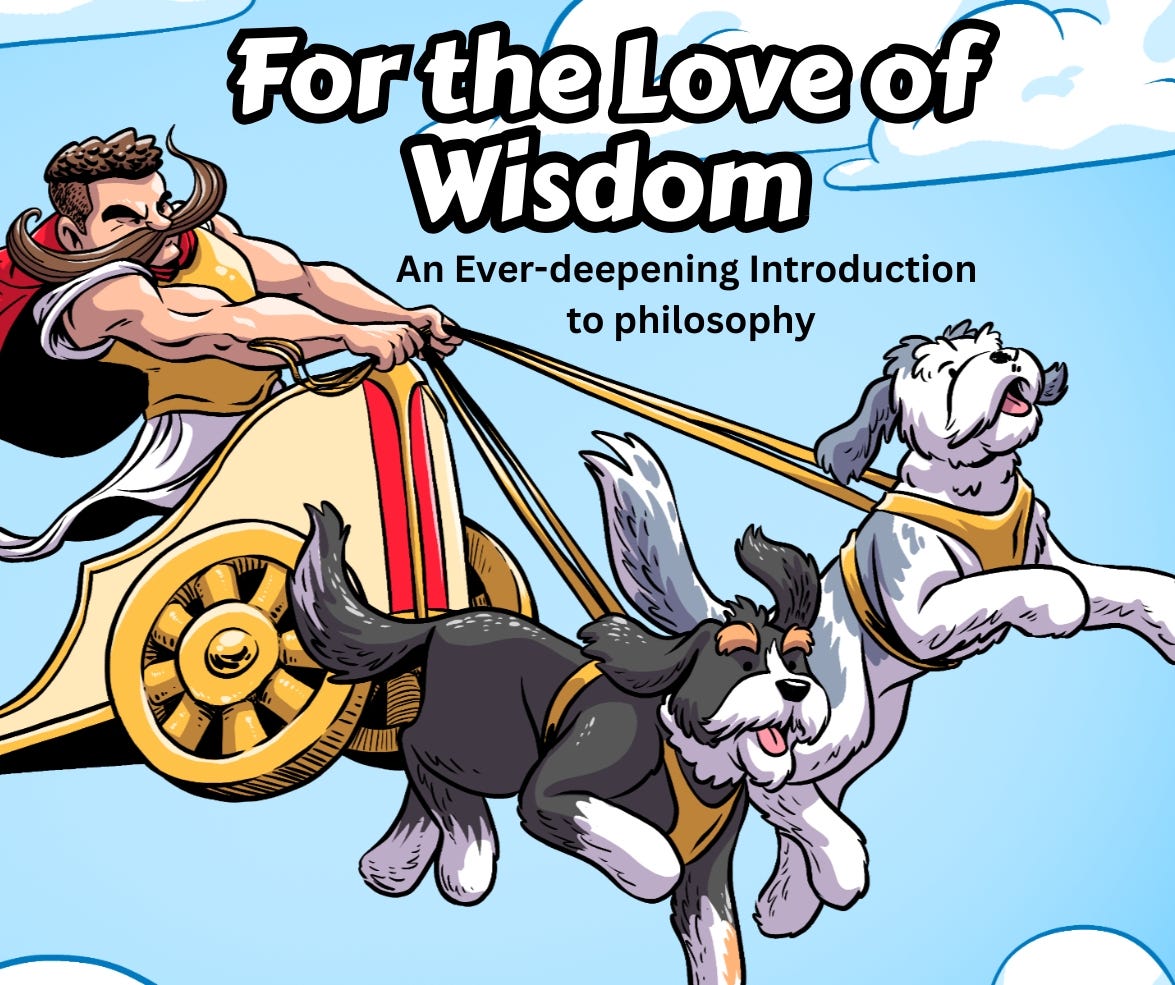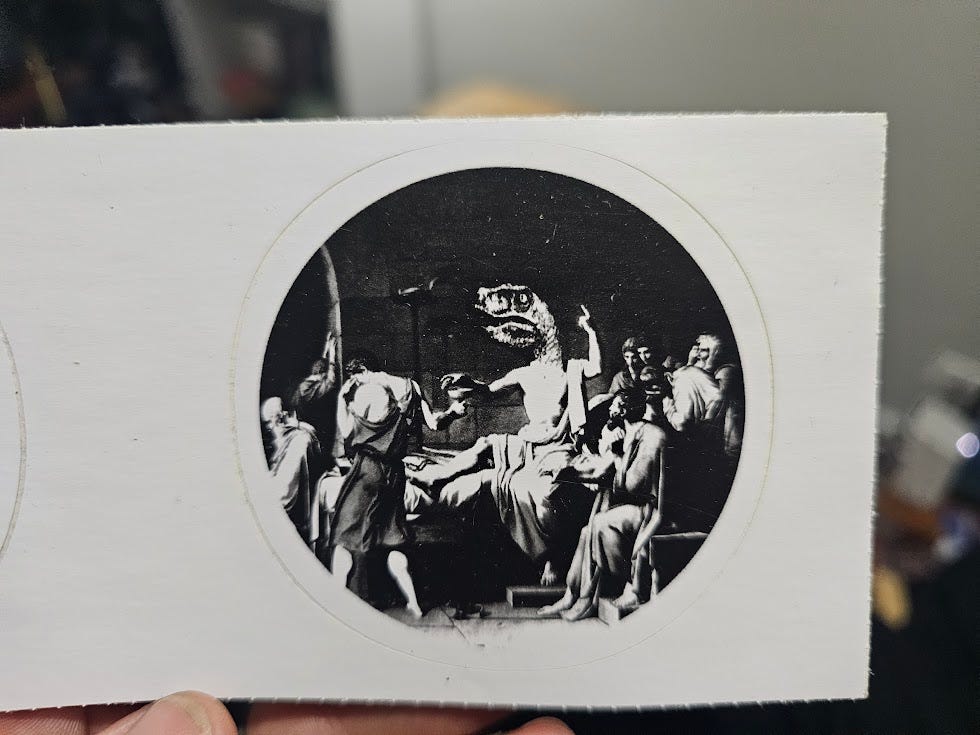What Do Philosophers Even Do? | For The Love of Wisdom entry 1
An Ever-Deepening Introduction to Philosophy: What is it?

Welcome to the first installment of For the Love of Wisdom: An Ever-Deepening Introduction to Philosophy! This is the beginning of my digital dynamic introduction to philosophy. I’m calling it ‘dynamic’ because you’ll be able to interact with the posts, leave feedback, ask clarifying questions, and shape the form and content of future entries through your feedback.
If you don’t know much about me, I’m Parker and philosophy is my life. Everyday I spend hours reading, writing, or thinking about or otherwise doing philosophy. I have several YouTube channels where I discuss philosophy. I also have this publication—Parker’s Ponderings, which you’re currently reading—where I write and write about philosophy. And I have my
publication where I write philosophical science fiction and fantasy short stories (and where I’m serializing my science fiction novel, Block World). I’m a philosophy nerd and I love sucking people in to learn and nerd out with me.On my biggest platform, ParkNotes on YouTube, I have to Trojan-horse philosophy into videos on notebook habits, reading methods, and productivity tips so people will be interested in learning it. But I’ve had many folks across the different platforms I post content on, including some on ParkNotes, ask me to explicitly help them learn philosophy—without wrapping it in notebook videos, science fiction stories, or otherwise Trojan-horsing it in.
So, after polling my audience across a few different platforms, I’ve decided to start my own introduction to philosophy text book—so to speak. It’s my aim in this ever-deepening introductory series to help you continue to engage in philosophical inquiry as you learn more and more philosophy.

My Pedagogy
I’m going to introduce you to philosophy as I’ve come to understand it through 13 years of self-study and 11 semesters of formal graduate work. I continue to keep one foot in the academy through my podcast where I mostly talk with academics about their academic work, and through publishing articles in academic philosophy and theology journals, as well as presenting papers at academic philosophy conferences.
But more and more I’m finding my true love is public philosophy—bringing you up to the middle shelf and bringing the top-shelf philosophical cookies down to you, so I’m bringing philosophy down, but not all the way down, I’m also going to help you step up a bit as well.
I’m not done learning yet, so as I continue to learn, I’ll share what I learn with you.
I’m going to start with very basic intro stuff and gradually introduce deeper and deeper ideas with more detail as we go. The hope is that you’ll read each of these entries, which are meant to build on each other, so that you’ll have the concepts needed to think more deeply about the cutting-edge philosophy I introduce later on.
This is not a straightforward Introduction to philosophy text book just serialized. It’s going to be a hodgepodge of exciting philosophical ideas I want you to know, explained in a way that will help you come to understand the field as I know it. So, that means some entries will be on a particular philosophical problem or puzzle, like the problem of external world skepticism, or the omnipotence paradox, or the experience machine, inverted qualia, machine consciousness, arguments for and against the existence of God etc. Other posts will be on particular thinkers—straight up philosophers, or otherwise—like René Descartes, Byung-Chul Han, St. Augustine, David Chalmers, Pythagoras, Plato, Frank Herbert, C.S. Lewis, Camus, Cornelius Van Til, Zhuanzi, Henry David Thoreau, and more. Still other posts will be very basic compendium style information dumps and explanation of how to do philosophy, like a post on counter-examples and how they work in philosophy, or reductio ad absurdum, or different argument forms like modus ponens or modus tollens, or different views on ‘substance’ or ‘possible worlds’, or how to start your own aphoristic philosophy journal, etc.
The options here are near unlimited. Different types of posts will probably have different styles as well, but whatever the case, the successive entires will build on one another such that if you continue reading along, you’re going to:
be well familiarized with the general discipline of philosophy
you’ll have a better understanding of the particular concepts of philosophy
you’ll be more able to philosophize yourself
So my goal is to teach you philosophy and how to do it for yourself, for as René Descartes says:
We shall not become philosophers if we have read all the arguments of Plato and Aristotle but are unable to form a secure judgement on the matters in hand. -René Descartes, Rules for the Direction of our Native Intelligence ( AT 10.367)
Now, while I was earning my three Master’s degrees (philosophy, systematic theology, and theological studies), I was also hosting a podcast called Parker’s Pensées where I would invite the authors of philosophy and theology books that I read on my own, or which I was assigned to read in class, onto my podcast and we discussed their ideas in a sort of “office hours” convo. I used to host 2 to 3 podcast episodes a week back in the day—it was pretty insane actually. I’ve slowed down a lot since then, but I’m still actively hosting it.
With that said, you can watch or listen through those old episodes to help get a better grip on the topics I broach in each entry on your own by checking out my Parker’s Pensées YouTube channel. Additionally, I will share links to relevant episodes in each of these For the Love of Wisdom (FLW) posts. And additionally, additionally, I will look for new or return podcast guests to help me think through forthcoming FTLW posts so I can share those new episodes with you to help you learn more.
On top of the podcast episodes, I’ll also share “for further study” sections at the end of each post with books, articles, other podcasts or YT vids, etc. which will help you go deeper into the subject—this will be a relief for me since I won’t have to bear the full burden of your philosophical education haha, but it will also be a great resource for you to find other philosophers to learn from.
Through my grad school time and hosting my podcast, I’ve come to know and befriend hundreds of philosophers and theologians. If this project takes off, I may consider reaching out to get guest entries from some of them as well, especially on their own areas of expertise.
If you don’t understand something in the post, or want to practice philosophizing by arguing with a definition or an argument from the post, you can ask your questions or drop your counter-arguments right here in the comment section. If you’d rather send a message in the paid subscriber chat, that works too, or you can send me a direct message as well.
That brings me to the paywall. The majority of these posts are going to be paid posts, behind a paywall, for my paid subscribers. This project is going to take a ton of work and will require lots of hours of boning back up on my old studies and it will require lots of new research and thinking. I’m looking to write full-time here on Substack and the trajectory is actually looking pretty promising. I really love teaching philosophy and the way I see it, this will be something like teaching extended philosophy course—even just writing about it here gets me excited.
So, if you like my work and want to support it, or if this idea of learning philosophy from the basics up to the cutting-edge sounds exciting, upgrade to a paid subscription and let’s get to work.
Now, for the rest of this post I’m going to try to define philosophy for you. What is philosophy?
What Is Philosophy? What Do Philosophers Do?
What is philosophy? Can we even define it? Can we ever truly know what it is? Can we determine its subject matter? Does it actually tell us anything about reality or is it just a big waste of time? Why should even I care?
If you’re asking yourself these questions, then congrats! You’ve already




